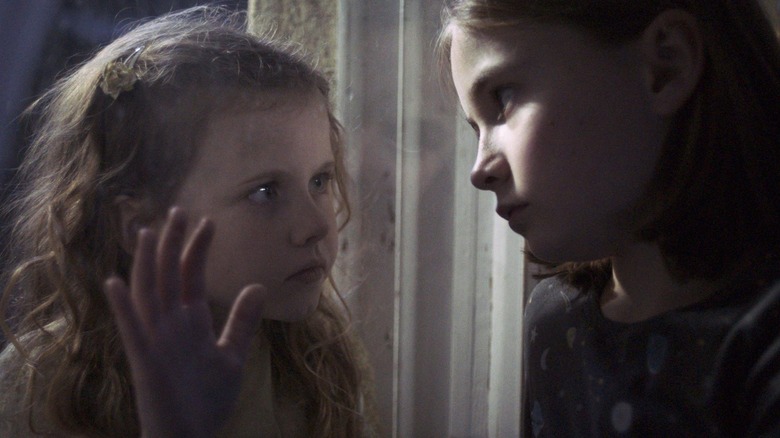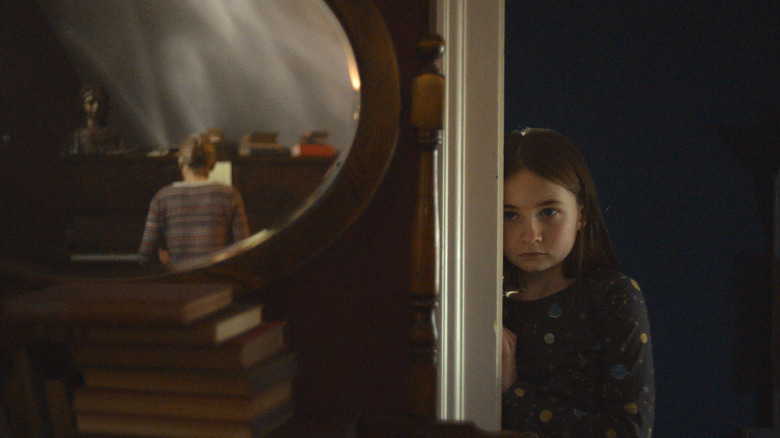The Daily Stream: Martyrs Lane Haunts With Heart
(Welcome to The Daily Stream, an ongoing series in which the /Film team shares what they've been watching, why it's worth checking out, and where you can stream it.)
The Movie: "Martyrs Lane"
Where You Can Stream It: Shudder
The Pitch: Ten-year-old Leah (Kiera Thompson) lives with her increasingly distant mother Sarah (Denise Gough) in a massive vicarage filled with various souls in varying stages of survival. During the day, the place is jumping with parishioners giving and receiving support; come nightfall, the nooks and crannies of the household make for ample hiding spots for figments of Leah's imagination. Or are they? Every evening, Leah is visited by a tiny, meek visitor (Sienna Sayer) who comforts her at first, playing games and spilling secrets. As the nights go on, however, the games become more precarious and the visitor's presence becomes more and more unsettling. Ruth Platt's story is a powerful composite of Ann Turner's highly underseen 1989 Australian horror film "Celia," and just about any Guillermo del Toro film centered around the dangers innate to a child's existence.
Why It's Essential Viewing
Ruth Platt understands how scary the world can be for children as they navigate its rules and systems. It's a broad concept, one that's been explored in horror thoroughly from Stephen King's behemoth opus "It" to Del Toro's "The Devil's Backbone" and "Pan's Labyrinth." Leah is tasked not only with growing up in the chaos of a vicarage, but also with managing her own emotions and those of people around her.
The first specter of struggle comes amid a time of chaos for Leah, as she is treated poorly by her sister Bex (Hannah Rae), who uses a "2 Truths, 1 Lie" pretext to shower emotional abuse upon the child. Judging by Leah's resigned acceptance of the torment, Bex has been a horrible sister for a hot minute and it's something the girl has to anticipate and work around. On top of that, Leah's mom Sarah has, to her young eyes, checked out. Sporting a dead-eyed weariness that could only come from years of poor sleep, Sarah keeps the kids alive, bathed, and fed, but any connection more intimate than that is a tall order for the tired woman. It's clear that Mom is going through something internally, but because "Martyrs Lane" privileges Leah's point of view, the precise source of hurt is ambiguous for much of the runtime, save for the clues that Leah's visitor provides.
A shadow lures Leah upstairs in the first calm moment of the film. At first, this presence brings solace — she's another child about Leah's age, dressed in a little girls' angel costume. Eventually, she reveals her name to be Rachel, and Rachel likes to play games. Each night, she sends Leah on quests to recover trinkets hidden around the grounds. When Bex learns of a few of these bits and baubles Leah's collected (mind you, no one else is aware of Rachel), she instructs her to literally bury the secrets the trinkets threaten to tell. "Martyrs Lane" is, above all else, a haunting account of grief, where the various shades of loss infuse into all relationships like groundwater seepage.
An emotional language of coldness characterizes most interactions within the 96-minute runtime; the communication is stunted and the jumps to dismissal are swift. As a parent navigating her own pain to the detriment of relationships around her, Sarah Gough carries her character's emotional weight with Sisyphean effort, no surprise to those who caught her as weary but defiant sister-wife Sarah in Małgorzata Szumowska's 2019 festival darling "The Other Lamb." It's also in this frigid space that self-professed guardian angel Rachel operates, whispering things that her family seems to know of but none dare confront aloud. For most of the film we don't know what these trinkets mean, or why Leah's silly repetition of her ethereal friend's toothpaste anecdote upsets her mother and prompts her sister to intentionally tickle her into an asthma attack. Learning the truth is, in this family, almost like confronting their own dedicated Babadook. Add to it some stunning cinematography, courtesy of longtime Peter Strickland collaborator Márk Györi, and Anne Müller's gentle companion score of curiosity and regret, its notes pregnant with all of Leah's unanswered questions — comparable, if you please, to Peter Dascent's whirlwind compositions within Peter Jackson's '94 horror fantasy "Heavenly Creatures" — and you end up with a lyrical, poignant meditation on buried pasts and unearthed hurt.

